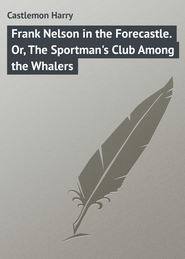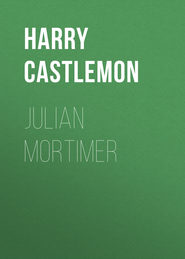По всем вопросам обращайтесь на: info@litportal.ru
(©) 2003-2025.
✖
Frank Before Vicksburg. The Gun-Boat Series
Настройки чтения
Размер шрифта
Высота строк
Поля
What a slaughter – a useless slaughter – there had been! And all had been occasioned by the ignorance of the commanding officer of the expedition. Had Frank been allowed to retain the sheltered position which he had at first taken up, the result would have been far different. And how had he escaped without even a scratch? He had stood beside his men during the whole of the fight – freely exposing himself, and, rendered conspicuous by his uniform, had signaled the vessel twice; and each time the flag had been riddled by bullets, but not a shot had touched him! It seemed but little short of a miracle that he had come off unscathed, when so many men had fallen around him.
He was interrupted in his meditations by the entrance of the orderly, who informed him that his presence was wanted in the cabin. Frank hastily pulled on his coat and repaired thither. As he entered, the captain said:
"Take a chair, Mr. Nelson. I wish to have a few moments' serious conversation with you."
Frank, surprised at the captain's tone and manner, seated himself, and the latter continued:
"Are you aware, sir, that you have this day destroyed all the confidence I have hitherto placed in you, and have rendered yourself liable to severe punishment?"
The effect of this question, so abruptly put, was astounding, and Frank could only falter —
"Sir? I – I – don't understand you, sir."
"Mr. Nelson, I am surprised at you, sir," said the captain, sternly. "I shall have to refresh your memory, then. You have this day been guilty of misdemeanors, any one of which renders you liable to a court-martial, and to a disgraceful dismissal from the service. In the first place, you have shown gross disrespect to your superior officer, and" —
"I guilty of disrespect, sir!" repeated Frank, scarcely believing his ears. "There must be some mistake, sir, for" —
"Don't interrupt me, sir. I repeat, you have been guilty of disrespect to your superior officer, and of cowardice, having been found with your battery far in the rear at a time when your services were very much needed at the front; and then, after the fight had fairly commenced, as if waking up to a sense of your duty, and, no doubt, wishing to make amends for what you had done, you, contrary to orders, recklessly exposed your men, and, as a consequence, out of forty of the bravest fellows that ever trod a ship's deck – which were placed under your command this morning – you had but fifteen left when you returned on board. The energy displayed by you in working your battery, and the manner in which you obtained possession of it, after you moved out from your sheltered position, and had been compelled to retreat, were feats of which any officer might be justly proud, and which I should have been most happy to reward with your promotion, had you not spoiled every thing by your infamous conduct at the commencement of the fight. Hitherto, since you have been on board this ship, you have been a good officer, have always attended to your duties, and it pains me to be obliged to talk to you in this manner. I never thought that you, after what you did at Cypress Bend, while you were on board of the Milwaukee, would ever have been guilty of such misdemeanors. However, as your conduct heretofore has always been such as I could approve, I shall see that no charges are made against you; and I sincerely hope that what you have learned to-day will be a lesson that you will never forget. I shall give you sufficient opportunities to make amends for what you have done, and I shall commence by sending you ashore with a flag of truce, to ask permission of the rebels to bury our dead. You may start at once, sir."
This was a hint that his presence in the cabin was no longer desirable, and Frank, who, in his confusion and bewilderment scarcely knew what he was doing, made his best bow and retired.
What his feelings were as he listened to this reprimand, administered by the captain, who never before had spoken a harsh word to him, it is impossible to describe. He again thought over every thing he had done during the fight; how he had, at the commencement of the action, beaten back the rebels, with a mere handful of men; how he had, in obedience to orders, taken the exposed position where he had lost so many of his gun's crew, and which he had held in spite of the storm of bullets that rained around him, until the whole line had been compelled to retreat, and he was left unsupported; how he had twice risked his life in signaling the ship; and how, when the retreat was ordered he had brought back his guns in safety: he thought of all these things, and wondered where the charge of cowardice could be brought in. And then, when and how had he been guilty of disrespect to his superior officer? Certainly not in remonstrating against ordering the men to stack their arms, for that was a privilege to which he, as one of the commanding officers of the expedition, was entitled. In regard to recklessly exposing his men, the case was not quite so clear. It was true that, in the beginning of the fight, he had ordered a charge upon the rebels, who greatly outnumbered his own men, and had easily driven them, without loss to himself: perhaps it was there that the third charge had been brought in. But although he was conscious that he had endeavored to do his whole duty, the words of the captain had cut him to the quick. It had been an unlucky day for him. The expedition had proved a failure, and he had been accused of misdemeanors of which he had never dreamed. It seemed as if fate was against him.
"I believe, as Archie used to say," he soliloquized, "that I am the unluckiest dog in existence. Troubles never come singly."
"The captain wishes to see you, sir," said one of the men, stepping up and interrupting his meditations.
"All right," answered Frank, who was so completely absorbed in his reverie that he was entirely unconscious of what was going on around him; "call all hands to quarters immediately."
"Sir – I – I don't mean – sir – the captain wishes to speak with you, sir," repeated the sailor, half inclined to believe that Frank was getting crazy. This aroused the young officer to a sense of his situation; as he approached the quarter-deck, where the captain was standing, the latter said:
"Mr. Nelson, do you intend to go ashore with that flag of truce, sir?"
"I beg your pardon, sir," faltered Frank, "I forgot all about that. Will you have the kindness to call away the first cutter?" he continued, approaching the quarter-master, and saluting him as the officer of the deck.
"Mr. Nelson," shouted the captain, "what are you doing? Are you crazy, sir?"
"I believe I am, captain, or pretty near it," answered Frank. "The charges that have been brought against me have well-nigh upset me. They are false, sir, and I don't deserve the reprimand I have received."
In his next attempt to find the officer of the deck Frank met with more success. While the cutter was being manned, he ran down into the steerage, and seizing a pen, hastily dashed off the following:
United States Steamer Ticonderoga, }
Off Cypress Bend, Oct. 30, 1863. }
Sir:
Having been reported, by the officer in command of an expedition – sent ashore this day for the purpose of dislodging a body of rebels posted behind the levee – for cowardice, disrespect to my superior officer, and for recklessly exposing my men to the fire of the rebels, and knowing, sir, that these charges are utterly groundless, I respectfully request that a Court of Inquiry may be convened to examine into my behavior while under the enemy's fire.
I am, sir, very respectfully
Your obedient servant,
Frank Nelson,
Acting Master's Mate.
Acting Rear-Admiral D. D. Porter, U. S. N.,
Commanding Miss. Squadron.
While he was sealing the envelope the messenger boy entered and reported the cutter ready. Frank ran on deck, and, after giving the communication to the captain, with a request that it might be approved and forwarded to the Admiral, he sprang into the boat, and gave the order to shove off.
The old boatswain's mate, who was acting as the coxswain of the cutter, had rigged up a flag of truce. As they pulled toward the shore, Frank waved this above his head until he elicited a similar response from the bank; then, throwing down the flag, he seated himself in the stern sheets, and covered his face with his hands. The old mate, mistaking his emotion for sorrow at the death of so many of his men, said:
"Yes, it is a hard case. Not a few of us are left without our chums; but we all know it wasn't your fault. There would have been more of us left if you had been allowed to have your own way."
"Then I did not expose you needlessly, did I, Jack?"
"Why, bless you, no, sir. Who says you did, sir?" inquired one of the crew.
"But tell me one thing, Jack," said Frank, his face still covered with his hands, "Am I a coward?"
"No, sir," answered the mate, indignantly; "'cause if you was, you wouldn't have held on to them guns as long as you did, and you would not have pitched into that rebel atween the lines, as you did about a year ago, at this very place. In course you ain't no coward."
This was some consolation. The men whom he commanded, and who had always cheerfully followed where he had dared to lead, thought very differently from the man who had retreated almost before the fight had commenced, and who, to screen himself, had brought those charges against one whose conduct had always been above reproach.
"Yes, as you say, it is a hard case, Jack," said Frank, uncovering his face, and glancing toward the rebels who thronged the levee. "It is a hard case, indeed, but I will come out at the top of the heap yet."
"What's the matter, sir?" inquired the mate. "Any one been wrongin' you, sir? He'd better not show his ugly figure-head when what's left of the first division has shore liberty. We'll douse his top-lights for him."
By this time the cutter had reached the shore, and Frank, taking the flag of truce, sprang out, and walked up the bank to where a group of officers was standing.
"Wal, Yank, what do you want now?" inquired a man dressed in the uniform of a colonel.
How Frank started when he heard that voice. Could he be mistaken? He had certainly heard it before, and he remembered the time when it had given an order which still rang in his ears: "Stiles, you stay here until this man dies." He looked at the men, some of whom were lying on the ground about the levee, and others standing at a little distance, waiting to hear what was going to be the result of the interview, and what had at first appeared a vague suspicion, now forced itself upon Frank as a dread reality. He was in the presence of Colonel Harrison and the Louisiana Wild-cats. Nothing but a bold front could save him, for he knew that these men paid very little respect to a flag of truce, unless it was likely to further their own interests; and if he should be recognized, his recapture was certain, and then, what would be his fate? Would not summary vengeance be taken upon him, in retaliation for the manner in which he had treated the sentinel on the night of his escape, and the way he had served the man who had overtaken him in the woods? Brave as Frank was, and accustomed as he had become to look danger in the face, he could not but regard his situation as critical in the extreme.
"What did you say your business was, Yank?" inquired the colonel again.
"I wish to see the commanding officer," said Frank, steadily meeting the rebel's searching glance. "I wish permission to bury our dead."
"Well, that's a fair request," said the colonel, carelessly. "I don't know as I have any objection to it. Want your prisoners also?"
"Yes, sir," answered Frank, with a smile. "I should like to take them back to the ship with me. But you know that I have none to exchange for them."
"That's what I thought. I couldn't afford to give your men back for nothing."
"I didn't suppose you would. But have we your permission to come ashore and bury our dead?" inquired Frank, who was anxious to bring the interview to an end.
"Yes," answered the colonel, "and we will leave the field in your possession. You will send that message by one of your men, for I don't think, youngster, that you can go back. If I am not very much mistaken, I've got a better right to you than any one else."











